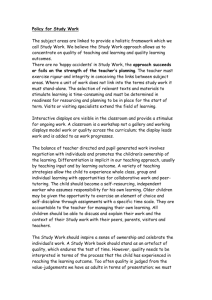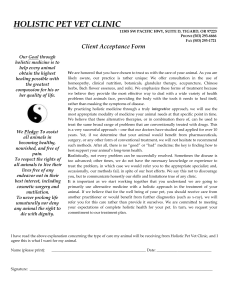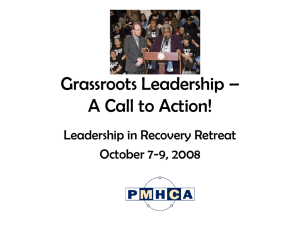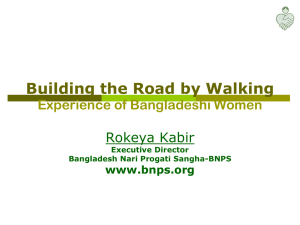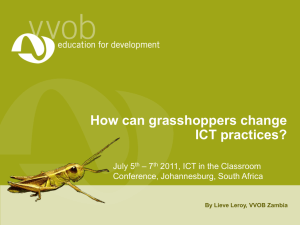Sustainability News – 12 October 2015
advertisement
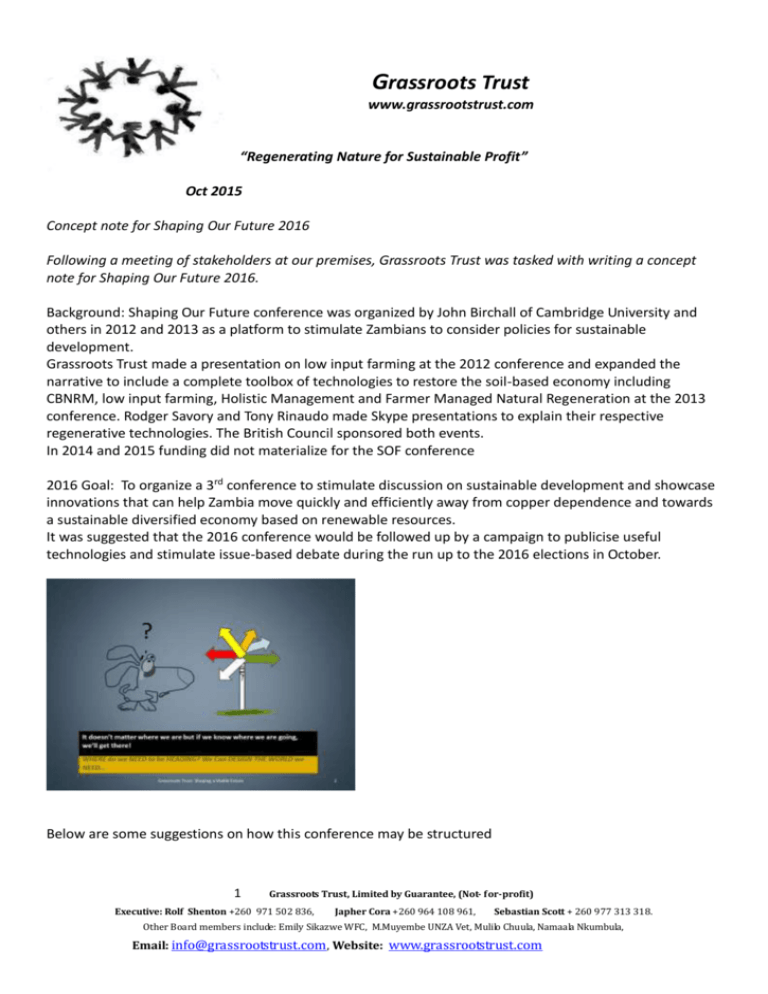
Grassroots Trust www.grassrootstrust.com “Regenerating Nature for Sustainable Profit” Oct 2015 Concept note for Shaping Our Future 2016 Following a meeting of stakeholders at our premises, Grassroots Trust was tasked with writing a concept note for Shaping Our Future 2016. Background: Shaping Our Future conference was organized by John Birchall of Cambridge University and others in 2012 and 2013 as a platform to stimulate Zambians to consider policies for sustainable development. Grassroots Trust made a presentation on low input farming at the 2012 conference and expanded the narrative to include a complete toolbox of technologies to restore the soil-based economy including CBNRM, low input farming, Holistic Management and Farmer Managed Natural Regeneration at the 2013 conference. Rodger Savory and Tony Rinaudo made Skype presentations to explain their respective regenerative technologies. The British Council sponsored both events. In 2014 and 2015 funding did not materialize for the SOF conference 2016 Goal: To organize a 3rd conference to stimulate discussion on sustainable development and showcase innovations that can help Zambia move quickly and efficiently away from copper dependence and towards a sustainable diversified economy based on renewable resources. It was suggested that the 2016 conference would be followed up by a campaign to publicise useful technologies and stimulate issue-based debate during the run up to the 2016 elections in October. Below are some suggestions on how this conference may be structured 1 Grassroots Trust, Limited by Guarantee, (Not- for-profit) Executive: Rolf Shenton +260 971 502 836, Japher Cora +260 964 108 961, Sebastian Scott + 260 977 313 318. Other Board members include: Emily Sikazwe WFC, M.Muyembe UNZA Vet, Mulilo Chuula, Namaala Nkumbula, Email: info@grassrootstrust.com, Website: www.grassrootstrust.com Holistic Context Holistic Management is a framework developed by the Savory Institute to ensure that decision- makers consider social, environmental and economic factors both short and long term thus avoiding un-intended consequences. Building consensus over Holistic Context, cooperation and collective action can help lead to regeneration and growth Some context issues to Consider: Economic factors the growing population of Zambia and combining with increased consumption levels in pursuit of improved quality of life, the country needs a steadily increasing resource base. By 2050, 50m people may require 40x more resources than today. Considering the long term global trends, this would have to be achieved with decreasing dependence on fossil fuel-based inputs as rising prices and dwindling supply would continue forcing input costs like fertilisers and fuel higher. Considering the global financial downturn and the Zambian current devaluation, reducing dependence on imported inputs needs to be prioritized. Available water for growth and energy production is becoming scarce thus threatening growth. Since the water is effectively managed by land-users all over the country, finding solutions to make rains more effective will have to involve every citizen. Environmental factors Soil, water and the biodiversity it supports forms the basis of sustainable growth of food, fiber and energy. Both are being degraded rapidly primarily due to failure to recognize the importance of managing organic matter. This trend will undermine efforts to increase productivity/profitability and it is therefore critical to address the root causes of environmental malfunction. Most of Zambia’s natural resources are hemorrhaging due to a failed centralized management structure under which citizens especially land-managers are not involved in decision-making. Implementation of CBNRM policy must be prioritized to arrest the tragedy of the commons that is unfolding. 2 Grassroots Trust, Limited by Guarantee, (Not- for-profit) Executive: Rolf Shenton +260 971 502 836, Japher Cora +260 964 108 961, Sebastian Scott + 260 977 313 318. Other Board members include: Emily Sikazwe WFC, M.Muyembe UNZA Vet, Mulilo Chuula, Namaala Nkumbula, Email: info@grassrootstrust.com, Website: www.grassrootstrust.com Efforts to eradicate pests and disease have failed. Global consensus is that increasing biodiversity was the only sure way of building resilience to diseases- Zambia is currently sprinting in the wrong direction. Social factors Widening wealth gap: Continuous efforts must be made to reduce the wealth gap to avoid the inevitable social unrest that comes with disparate wealth. Instead social dynamics must create positive incentives for the population to manage resources well. Sustainable production is most likely to happen at small-scale farming level and Community based natural resource management. Building consensus on appropriate sustainable technologies, goal setting and transferring responsibility and rights from centralised authorities to local communities is a process that must be inclusive and allow people to clearly define their roles and duties. In order for an effective transformation to a sustainable economy to happen, a new concept of education will be needed that respects traditional knowledge, cultural and heritage values. Grassroots Trust engages with land owners and policy-makers to stimulate and mentor holistic thinking. Grassroots promotes four globally proven technologies that regenerate eco-systems whilst improving profitability. Tools to stimulate regeneration and growth Holistic Management is a framework developed by the Savory Institute to ensure that decision- makers consider social, environmental and economic factors both short and long term thus avoiding unintended consequences. Individual farmers are relatively poor but together they control vast lands and natural resources. Building consensus over Holistic Context, cooperation and collective action from all stakeholders in a catchment can create exponential growth. Holistic Planned Grazing helps livestock owners revive natural/ traditional grazing patterns to improve pasture and eco-systems and reduce recycling of ticks, worms and parasites. Low input (regenerative) cropping enhances natural water cycles and nutrient flows to increase profitability and sustainability. Grassroots works with farmers and researchers around the world to develop integrated agriculture on the research/demo farm in Kafue. Our mission is to share low input successes and lessons learned with farmers around Zambia. Tree pruning is a widely-known technology to regenerate trees from stumps and bushes by removal of excess shoots and suckers. Most of the felled trees in Zambia are still alive and can be restored quickly and cheaply. Helping Communities understand the Holistic Context and Shape a Viable Future Where are we heading? Communities are in decline and resources are steadily depleting - moving towards desertification, environmental malfunction and inevitable conflict. Over the past half century, perhaps 90% of large wildlife has disappeared along with over 75% of livestock and a large part of Zambia’s forest. Fisheries are depleting fast and agricultural yields in rural communities are a quarter of what they once were. Where should we be heading? To cope with growing populations and increasing consumption, resources need to be regenerating. This must be achieved with low-input technologies to ensure resilience against diminishing global reserves of finite resources including fossil fuels and phosphorous. Where do we begin? To move from declining to regenerating resources requires addressing the four fundamental eco-system processes: 3 Grassroots Trust, Limited by Guarantee, (Not- for-profit) Executive: Rolf Shenton +260 971 502 836, Japher Cora +260 964 108 961, Sebastian Scott + 260 977 313 318. Other Board members include: Emily Sikazwe WFC, M.Muyembe UNZA Vet, Mulilo Chuula, Namaala Nkumbula, Email: info@grassrootstrust.com, Website: www.grassrootstrust.com COMMUNITY DYNAMICS, SOLAR FLOW, NUTRIENT FLOW AND WATER CYCLE. Low input, organic techniques focus on the recycling of dead plant material to the soil, which feeds soil life which in turn provides the nutrient flow for increased plant growth. Increased organic cover on the soil also encourages INCREASED INFILTRATION, reducing evaporation and run-off creating the requirements for increased photosynthesis and vegetation which in turn can begin feeding growth of higher species. Is it really possible to turn around the decline? Yes, technically it has proved quite easy – Grassroots Trust promotes tools that are tried and tested. Some impressive results have been achieved around the world using Holistic planned grazing, Low input cropping, Community Based Natural Resource Management (CBNRM) and Farmer Managed Natural Regeneration of trees (FMNR). Who needs to be part of this process? Everyone - the challenge is to mobilise all 7 million land managers in rural Zambia. This will require the national leadership to participate and work towards the common goal of regenerating the ecosystem How will we get everyone involved and behaving responsibly? Top-down, command and control management has on the whole failed. The answer lies in well-established economic and management principles: 1. Devolution of rights and responsibilities to the lowest appropriate level. 2. Tenure over resources in a defined area. 3. Creation of incentives through empowerment, economic opportunities and the reinstatement of traditional, cultural and heritage values. This implies that communities have to get organised. How do we do this? Since no-one or no authority has the answers to our problems, we begin with a meeting of everybody in the community Using Holistic Management to guide decisions Grassroots Trust promotes a process called Holistic Management designed by Allan Savory used around the world to turn around the fortunes of farms, businesses, communities and governments. HM thinking was employed successfully in the Namibian Conservancies Program where over 85 communities where regeneration is taking place across social, economic and environmental fronts The process: 1. People define the context of where they are in terms of social, economic and environment. 4 Grassroots Trust, Limited by Guarantee, (Not- for-profit) Executive: Rolf Shenton +260 971 502 836, Japher Cora +260 964 108 961, Sebastian Scott + 260 977 313 318. Other Board members include: Emily Sikazwe WFC, M.Muyembe UNZA Vet, Mulilo Chuula, Namaala Nkumbula, Email: info@grassrootstrust.com, Website: www.grassrootstrust.com 2. Everyone agree on how they want their lives to be in future – planning together towards Holistic Context 3. They define what needs to be done, and how everyone will have to behave in order to achieve their goals - collective action. 4. Grassroots Trust introduces a decision-making framework to help ensure that all decisions work towards the common goals whilst remaining in balance with social, economic and environmental factors. 5. Stakeholders agree on a monitoring and control mechanism so that wrong decisions are noticed and corrected in good time. It is easier to assume all decisions are wrong in the first place! Developing a representative decision- making structure Communities are encouraged to incorporate their common assets into a formal structure. These conservancy structures allow the community to partner with government, private sector and NGO’s in managing their common pool resources. Ongoing mentorships: Lusaka Province: Mwembezyi Natural Conservation Society, Chiyaba, Eastern Province: Ndake, Mololo and Mbangombe Chiefdoms Southern Province Siachitema, Mwenda, Livingstone Central Province: Mkushi Other start-ups pending: Kafue gorge community, Lunga - Luswishi GMA, Kanyenshya, Mpumba, Siavonga, Luembe, Kaoma , Hanjalika, Jumbe, Msoro, and Mwanya, Lake Tanganyika Conservation, Rufunsa GMA, Chitina, Mboroma, Lakes-Link Project Mweru, West Lunga Trust, Mukuni Organisations: GRZ, CBNRM Forum, NRCF, Women for Change, ZNCC, ZNFU, CFU, CSEF, CRS, Caritas, Tombwe Tobacco, Comaco, Kasisi Farms, ZLA, Small Scale Farmers Union, UNZA, GART, NRDC, Biofuels Zambia, Peacecorps, DAPP, CDT, ACF, Pelum, Biodivsity Alliance, WFP, DFID, Embassy of Sweden, PROFIT, LDS, HIVOS Technology Advisors include: Over 100 Traditional leaders and network of Zambian Land Managers, ZAWA, FD, Fisheries Dept, Allan Savory/African Centre for Holistic Management, Garth Owen-Smith IRDNC Namibia, Patricia Skyer WWF, Tony Rinaudo - World Vision, Adimir Calligari – IAPAR Brazil, Joseph Weltin- Majouru Meats, Seb Scott Old Orchard Farm, Sky Services, Hygrotech, Bob Shenton- Protea Farms, Lilai Farms, Johann ZeitsmannProfitable Ranching, Rodger Savory- Savory Grasslands Management, Roland Bunch, Small-Scale Farmers for Business FB, 5 Grassroots Trust, Limited by Guarantee, (Not- for-profit) Executive: Rolf Shenton +260 971 502 836, Japher Cora +260 964 108 961, Sebastian Scott + 260 977 313 318. Other Board members include: Emily Sikazwe WFC, M.Muyembe UNZA Vet, Mulilo Chuula, Namaala Nkumbula, Email: info@grassrootstrust.com, Website: www.grassrootstrust.com
